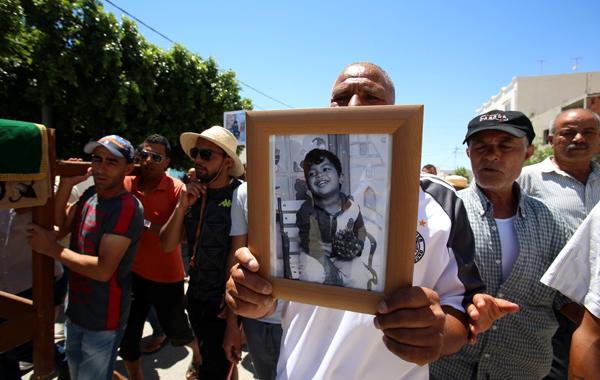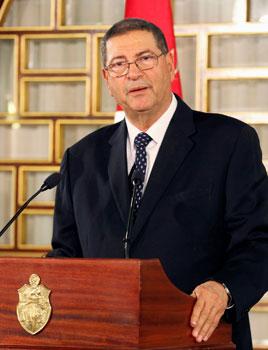You are here
Tunisian PM asks for vote of confidence
By AFP - Jul 20,2016 - Last updated at Jul 20,2016

A man carries a picture of Kylan Mejri who died in the Nice attack in France, during a funeral in Enfidha, Tunisia, on Wednesday (Reuters photo)
TUNIS — Tunisian Prime Minister Habib Essid on Wednesday asked for a parliamentary vote of confidence on his government, officials said.
Defeat in the vote would force Essid to stand down after just a year and a half in the job.
A government official, who did not wish to be named, told AFP that Essid had officially requested the vote of confidence following weeks of pressure to resign.
The vote is expected to take place next week, said a source in parliament.
Essid was already forced into a broad reshuffle in January, when the country witnessed its worst violence since the Arab Spring uprisings of 2011 that toppled president Zine Al Abidine Ben Ali.
The premier took another blow in early June when President Beji Caid Essebsi criticised his government on local and said he would consider proposals to create a new government of national unity.
Essid said in June that he would be ready to resign the post "if the country's interest demanded it".
Sources close to the prime minister say he is prepared to stand down but refuses to leave under pressure without a vote of confidence.
If Essid's administration loses the vote, the president would be required to choose the "most suitable person" to form a new government.
Political parties, unions and employers would then negotiate the formation of a new administration.
His supporters have condemned "pressure" from supporters of Hafedh Caid Essebsi, the president's son who is among the leaders of the Nidaa Tounes Party.
"If we want a real democratic transition, we must install democratic traditions," an official close to the prime minister told AFP.
Tunisia's current government is composed of four groups including the party Essebsi founded in 2012, Nidaa Tounes, and the Islamist Ennahda Party.
Last week, on Essebsi's initiative, political groupings including Nidaa Tounes and Ennahda listed the priorities of a new unity government.
The "Carthage Accord", which was also signed by Nobel Prize-winning groups the UGTT union and UTICA, painted a sombre picture of Tunisia's economic, social and security situation.
Fighting terrorism, corruption and unemployment, as well as addressing regional disparities, would likely remain the priorities for any new government.
Related Articles
TUNIS — Tunisia's prime minister-designate Youssef Chahed began talks on Thursday aimed at creating a unity government to tackle major econo
TUNIS — A senior member of Tunisian President Beji Caid Essebsi's ruling party said on Wednesday he plans to break away and form a new polit
TUNIS — Tunisian Prime Minister Habib Essid lost a confidence vote in parliament Saturday, in a move that risks plunging the country into fr

















